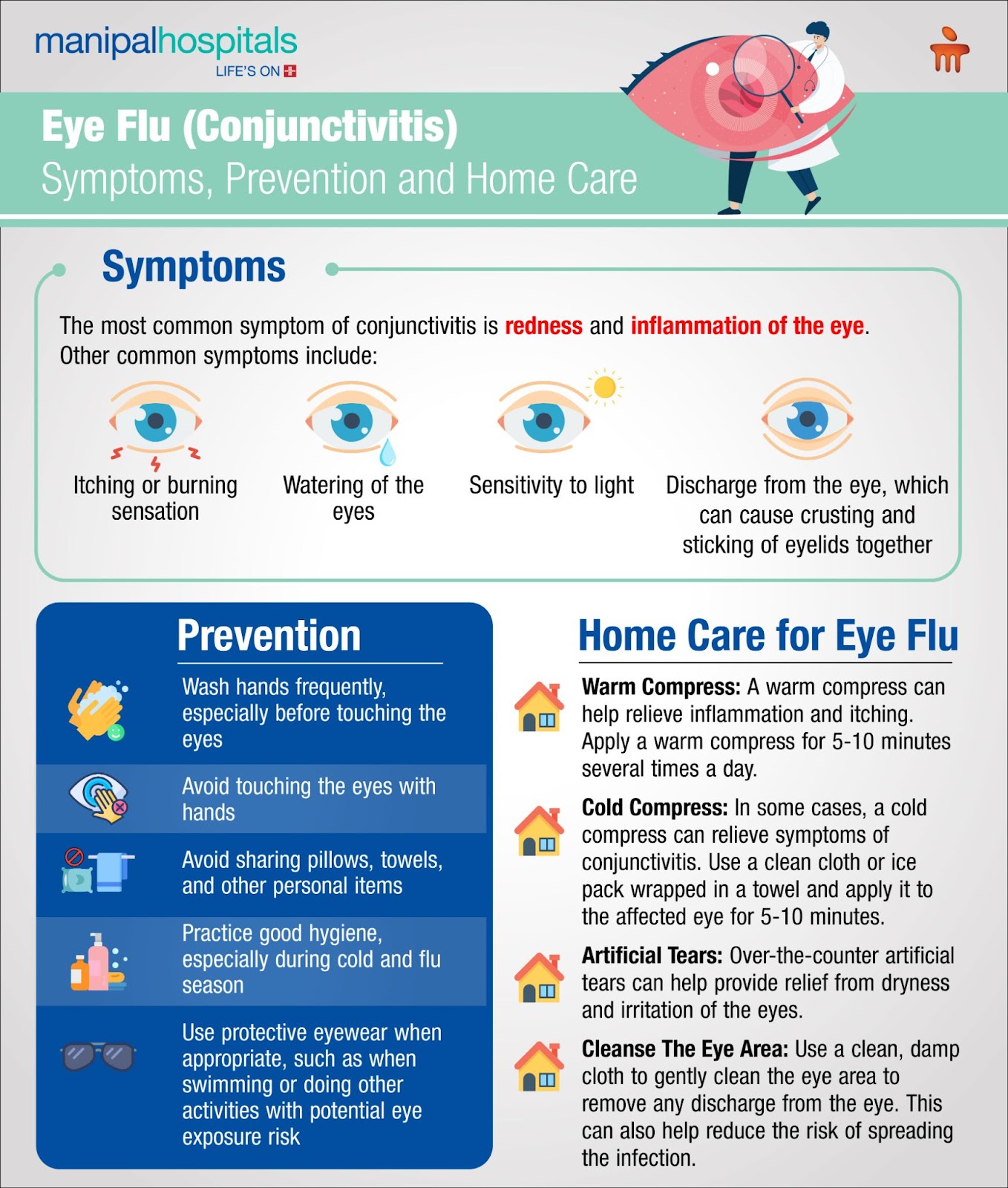
Conjunctivitis, commonly known as eye flu or pink eye, is an inflammation of the conjunctiva - the transparent membrane that lines the eyelid and covers the white part of the eye. Generally, Eye Flu is diagnosed in monsoon season. It can be caused by viral or bacterial infections, allergies, or other irritants.
In the latest medical reports, it is observed that more than 100 people are diagnosed daily with Eye Flu. Hence, it is advisable to follow the below-mentioned points to keep your eyes healthy. Dr. Vanuli Bajpai, Consultant - Ophthalmology, HCMCT Manipal Hospitals, Dwarka, says, "For the last two weeks we've been seeing a spike in acute conjunctivitis that is most likely viral."

Eye Flu Symptoms
The most common symptoms of conjunctivitis are redness and inflammation of the eye. Other common symptoms include:
-
Itching or burning sensation
-
Sensitivity to light
-
Discharge from the eye, which can cause crusting and sticking of eyelids together.
If you experience these symptoms, it is important to seek medical attention. Consult the best eye doctor at Manipal Hospitals for effective treatment.
Types of Conjunctivitis
There are three main types of conjunctivitis - viral, bacterial, and allergic:
-
Viral Conjunctivitis
This type of conjunctivitis is caused by a viral infection, such as the common cold or flu. It can be highly contagious, and symptoms can last up to two weeks.
-
Bacterial Conjunctivitis
This type is caused by a bacterial infection. Symptoms can include a yellowish-green discharge from the eye, and treatment usually involves antibiotics.
-
Allergic Conjunctivitis
Allergic conjunctivitis is caused by allergens such as pollen or pet dander. It can occur seasonally or year-round and is not contagious.
Eye Flu Prevention
The following steps can help prevent the spread of conjunctivitis:
-
Wash hands frequently, especially before touching the eyes
-
Avoid touching the eyes with your hands
-
Avoid sharing pillows, towels, and other personal items
-
Practice good hygiene, especially during cold and flu season
-
Use protective eyewear when appropriate, such as when swimming or doing other activities with potential eye exposure risk.
Eye Flu Treatment
While most cases of conjunctivitis require medical treatment, several eye flu treatments at home can provide relief from symptoms:
-
Warm Compress: A warm compress can help relieve inflammation and itching. Apply a warm compress for 5-10 minutes several times a day.
-
Cold Compress: In some cases, a cold compress can relieve symptoms of conjunctivitis. Use a clean cloth or ice pack wrapped in a towel and apply it to the affected eye for 5-10 minutes.
-
Artificial Tears: Over-the-counter artificial tears can help provide relief from dryness and irritation of the eyes.
-
Cleanse The Eye Area: Use a clean, damp cloth to gently clean the eye area to remove any discharge from the eye. This can also help reduce the risk of spreading the infection.
Conjunctivitis, or eye flu, is an inflammation of the eye that can be caused by viruses, bacteria, allergies, or irritants. Pink eye symptoms include redness, itching, and discharge from the eye. While some home care remedies can provide relief, it is important to seek medical attention at the best eye hospital in Bangalore if symptoms persist or worsen. Practising good hygiene and eye protection can help prevent the spread of conjunctivitis.
FAQs
1. What are the types of Pink eyes?
Pink eye, also known as conjunctivitis, can have different types based on the cause:
-
Viral Conjunctivitis: Caused by a virus, it's highly contagious and may cause redness, watery discharge, and itching.
-
Bacterial Conjunctivitis: Caused by bacteria, it can lead to redness, thick yellow or green discharge, and crusting.
-
Allergic Conjunctivitis: Triggered by allergens like pollen or pet dander, it causes red, itchy, and watery eyes.
-
Chemical Conjunctivitis: Caused by irritants like chemicals or smoke, leading to redness, tearing, and discomfort.
If you suspect pink eye, it's essential to consult an eye doctor for a proper diagnosis and treatment.
2. How can I treat viral conjunctivitis?
Here are some general guidelines:
-
Hygiene: Wash your hands frequently and avoid touching your eyes to prevent spreading the virus.
-
Warm Compress: Applying a warm compress to your eyes can help alleviate discomfort and reduce swelling.
-
Artificial Tears: Over-the-counter lubricating eye drops (artificial tears) can help soothe the irritation and keep your eyes moisturised.
-
Avoid Contacts: If you wear contact lenses, avoid using them until your symptoms have cleared up.
-
Avoid Eye Makeup: Refrain from using eye makeup during the infection to prevent further irritation.
-
Rest: Get plenty of rest to help your body fight off the virus.
-
No Rubbing: Avoid rubbing your eyes, as it can worsen the condition and spread the virus to your hands and other surfaces.
-
Consult a Doctor: If your symptoms persist or worsen, seek medical advice for proper evaluation and potential antiviral medications. Also, read the blog on How to prevent your eyes from pollution to protect your eyes from harmful dust particles.
3. How long does viral conjunctivitis last?
The duration of viral conjunctivitis, also known as pink eye, can vary depending on several factors. In most cases, viral conjunctivitis can last for about 1 to 2 weeks. However, the timeline may be influenced by the specific virus causing the infection, individual health factors, and how well the affected person follows hygiene measures to prevent its spread.
During this time, it's essential to practice good hygiene, avoid touching the eyes, and frequently wash hands to prevent the virus from spreading to others. If the symptoms persist beyond two weeks or worsen, it's advisable to consult with an eye doctor or a healthcare professional for further evaluation and appropriate treatment.
4. What precautions should I take to prevent the spread of pink eye?
For eye flu treatment at home or to prevent spreading pink eye (viral conjunctivitis) to others and to avoid re-infection, consider taking the following precautions:
-
Use Separate Towels: Use separate towels for your face and eyes, and avoid sharing them with others.
-
Change Pillowcases: Change pillowcases regularly during the infection and wash them in hot water to prevent reinfection.
-
Isolate Personal Items: Avoid sharing personal items such as towels, eye drops, or eye makeup with others.
-
Keep Hands Away from Others' Eyes: Be mindful of not touching or rubbing other people's eyes, as you could potentially spread the virus to them.
-
Stay Home: If possible, stay home from work, school, or public places until the symptoms improve to prevent spreading the infection to others.
-
Proper Disposal of Tissues: If you use tissues to wipe your eyes or nose, dispose of them properly in a trash can and wash your hands immediately afterwards.
5. Can washing with saline water help?
According to Dr. Vanuli Bajpai, "Saline or salt water is of no help, and rinsing your eyes with it can even irritate them further." He recommends making a homemade compress by dipping some clean cotton in clean warm water to help soothe irritation and to clean the discharge.





















 5 Min Read
5 Min Read










